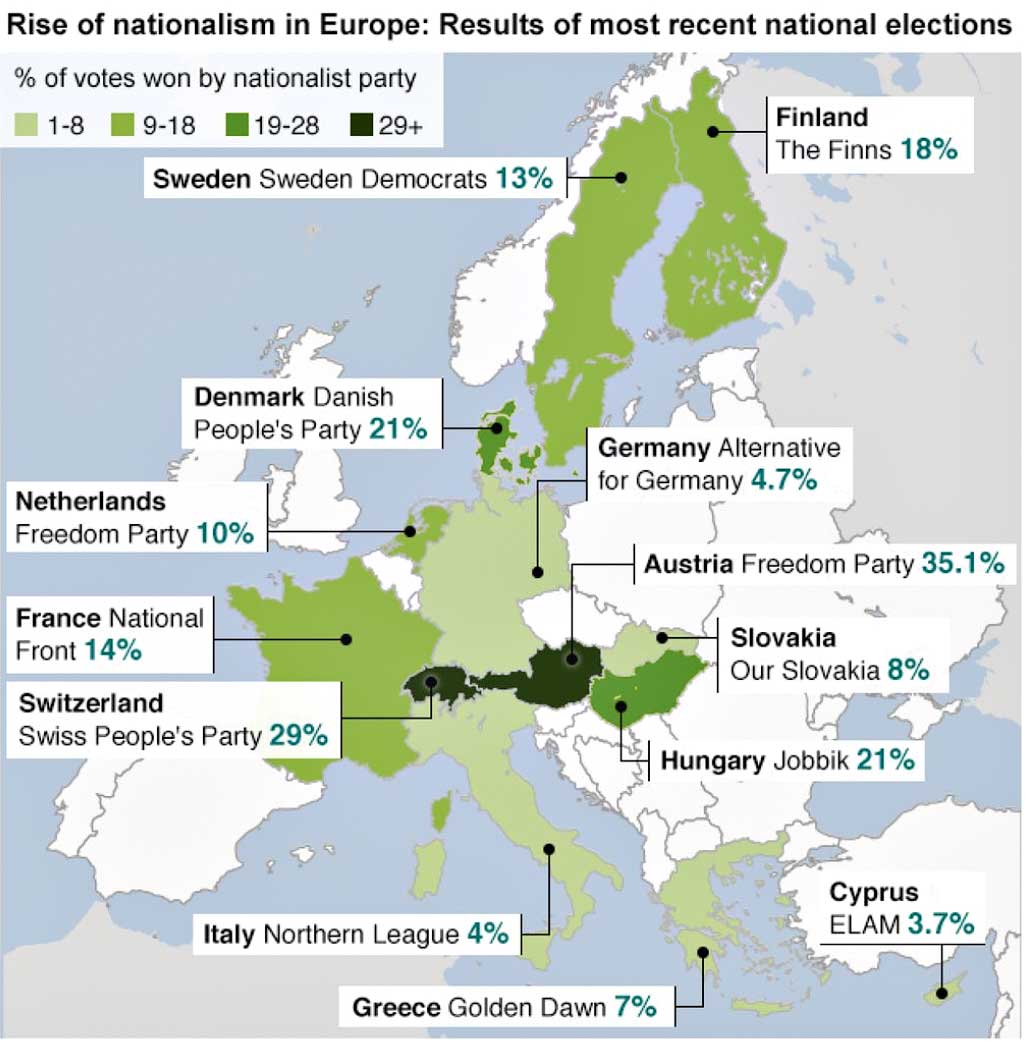The rise of nationalism in Europe: results of most recent national elections
Previous post: A documentary about Jeremy Corbyn
Next post: Three maps showing UK referendum regional voting intentions
A few thoughts about what's going on
Previous post: A documentary about Jeremy Corbyn
Next post: Three maps showing UK referendum regional voting intentions


thanks for snapshot Tony. It would be foolish to deny the growth of nationalist/ conservative/ xenophobic/ racialist parties in 21st century Europe. however, I’m not sure it proves anything in itself.
a/ a number of countries are missing data (ie blank on your map.) For instance those with a problem of existing internally focussed nationalisms: Basques and Catalans in Spain, Flamands in Belgium for example. Cyprus is a bit unique of course, having both an existing national-linguistic partition, and the growth of ELAM in one part as well.
b/ countries with existing internally focussed racialism, not least Poland, Hungary, Slovakia, Cz. Republic [apparently being renamed CZECHIA as we speak,: haven’t they read Malcolm Bradbury?]: here there are not only residual antagonisms hungover from 1918/1939/1945 border changes, but also the serious oppression of the Roma.
c/ a number of countries have prominent so called left opposition parties as well, though I would not be optimistic they will gain power, eg Portugal, Spain, Italy. These are countries where the centre right and far right have both different histories and of course high residual ideological resilience (Civil War/ fascist hangover).
d/ blocs where there needs data for comparison & analysis, from your map, seem to be
i British Isles, including (or excl.) Irish Rep.: eg UKIP not mentioned: is it a busted flush or just that a lot of xenophobes are busy with Brexit?
ii Balkans incl former Yugoslav republics, Romania, Bulgaria. Ironic that some North and West European nationalism is directed against immigration from this zone, but of course they have their own political divisions…
iii Baltic ex Soviet republics: don’t know much about this except there are still SS commemorations in Lithuania…
iii What about Norway?
What are the variables anyway? existing and proposed immigration? depth of austerity imposed by domestic or outside forces? emigration: how does this recompose the existing electorate (new age bias/ class bias)? existing right wing electoral strength? (eg Wouldn’t it be interesting to dig into the electoral patterns, eg in Hungary/ Poland/ CZ for the years say 1945-1949 (temporary democratic regimes pre Soviet takeover) and then 1990-2016, and then weight for economic conditions/ unemployment &c.)
I am only spinning out a cliché that there may be historic right wing patterns which are re emerging, with extra weight due to xenophobia/ islamophobia/ unemployment/ emigration & social disruption/ visible economic inequality with W. Europe/ this list is not exhaustive or reliable.
Plus Russia needs a book to itself…
I didn’t make the map – I just found it – so can’t do much about missing data. If I had to identify why the rise of nationalism is happening now I would list the following causes:
a) The protracted post 2008 stagnation in living standards and accompanying high unemployment makes a lot people angry and anxious
b) The way the eurozone is designed means it precludes, or at the very least severely constrains, the space for social democratic and centre left politics. Hence it is on the right that there is more space for radical politics.
c) The continuing economic globalisation and the continuing growth in internationalised financialisation means that people feel less and less in control of the things that matter so trying to re-empower the nation is a push back against that disempowerment.
d) The entire EU project, particularly after Maastricht and the creation of the euro, has wandered up a dangerously undemocratic path and there is a gut feeling amongst a lot of people that they want to get more national control of things – this chimes strongly with the previous point.
e) Mass migration into Europe, which is actually out of control and very large, and the parallel development of a significant threat from international Islamist violence and general Islamist intolerance, all stokes the nationalist fires.
My main concern is that the EU is now actually a block to left or progressive renewal and so we may well face a prolonged, and fairly awful, period of rising nationalism as the right fills the radical space.
BTW I came across this chart from the FT showing which social groups are intending to vote remain or Brexit in the referendum.
Comments on this entry are closed.